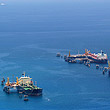| Published: Date: Updated: Author: |
The Bahamas Investor Magazine January 1, 2009 January 1, 2009 Steve Cotterill |
When Petroleos de Venezuela SA (PDVSA) announced in November 2007 that it was looking to sell the Bahamas Oil Refining Company International Ltd (BORCO) in Freeport, Grand Bahama, there was no shortage of eager suitors. The storage terminal facility is the largest in the region, with a 20-million-barrel capacity and the capability to blend, trans-ship and bunker fuel oil, crude oil and various petroleum products. But these were not the facility’s only selling points.
Located at Freeport Harbour on Grand Bahama, BORCO is just 80 miles from Florida and lies smack in the middle of trade shipping routes servicing the US Gulf and East coasts from Europe and the Middle East, as well as North American trade to Latin America and the Pacific. BORCO needed a buyer with experience and vision to realize its potential and turn the facility into the region’s premier trans-shipment hub for oil and petroleum products.
Enter energy industry investment company First Reserve Corporation and Dutch-based oil storage operator Royal Vopak (Vopak).
In April last year the two industry giants agreed to buy BORCO in a deal worth a reported $900 million. The equity value of the new company amounts to $550 million, with an 80/20 per cent split between affiliates of First Reserve Fund XI, LP and Vopak, respectively. The acquisition was financed in part by a senior secured credit facility fully underwritten by ABN AMRO Bank NV and DnB Nor Bank ASA.
The pedigree of the two new owners is not in doubt. First Reserve is the world’s leading private equity firm specializing in the energy industry. The company is currently investing its most recent fund, which closed in 2006 at approximately $8 billion.
Because First Reserve has invested exclusively in energy-related businesses during its 25-year history—from upstream reserves to downstream consumption as well as energy-related financial and insurance businesses—it has maintained a superior investment record, protecting a portfolio that repeatedly weathers the vagaries of economic cycles. Companies in which First Reserve funds have control or significant influence have around $13 billion of annual reserves and employ over 100,000 people.
Its partner, Vopak, is the world’s largest independent tank terminal operator, specializing in the storage and handling of liquid and gaseous chemical and oil products. It operates 76 terminals with a storage capacity of more than 26 million cubic metres in 31 countries.
Joining forces
The thinking behind the joint initiative by these two industry leaders was simple: tap the strong demand for hydrocarbons in the US. At the announcement of the acquisition, Thomas Sikorski, president of First Reserve, explained: “There are a couple of trends that are relevant toward [the acquisition]. The US is an increasing importer of global hydrocarbons. Therefore, it needs to increasingly feed the demand for gasoline, crude oil and fuel oil. Separately, a number of the international producers have refining capacity that they would like to utilize to access the US market.”
BORCO is positioned perfectly for this purpose. “We’ve spent a lot of time thinking about how we might tap those markets,” continued Sikorski. “One relevant fact is that US refining stops as you head south from Wilmington, Delaware, and there isn’t another refinery until Mississippi. So BORCO is very well located.”
William McCauley, chairman and chief executive of London-based First Reserve, agrees with his president’s comments. “The facility will provide significant value for our strategic partners, while also providing tremendous growth opportunities for The Bahamas,” he says. “The partnership with Vopak at BORCO is an exciting opportunity to support the growth of the world’s major oil companies by providing long-term access to facilities for storage and distribution services in a strategic part of the world.”
Investment plans
Before the ink had dried on the BORCO deal, the new owners announced their commitment to plans to invest $300-$600 million in upgrading the facilities and turning the site into a major storage and distribution hub. “We view this as a unique opportunity to transform an asset that was a cost centre and important part of PDVSA’s supply chain into a profit centre in our view of sustainable business,” says Sikorski. “We have endeavoured to develop an investment plan where we might renovate and fix existing capacity of the facility and develop an expansion plan on the available access land of additional investment and storage. Our goal is to transform the objectives of the company to a more active, thriving long-term business with long-term contracts with customers, a renewed investment in the jetties and a focus on delivery value to those global customers.”
The first phase of the redevelopment of the site will see the demolition of the existing refinery, repairing of tankage and planned expansion that will increase barrel storage capacity from 20 million to 25-30 million within the next couple of years. The project will also include work on the deep water jetties and the development of further service options.
The owners are confident the capital investment will bring profits as well as added value. “Vopak will leverage its global customer portfolio to increase the storage activities at this strategic location,” says John Paul Broeders, chairman of the Vopak executive board. “With the high interest expressed by future clients and the intention to invest in improvements and expansion, this terminal is expected to become profitable within the first couple of years.”
All this activity, of course, bodes well for the local economy. “This significant capital demonstrates First Reserve’s long-term commitment to the employees and will serve as a catalyst for increased development and production in The Bahamas,” concludes Sikorski. Given the current instability of the global economy, such news is a welcome boost to Grand Bahama, which is so dependent on the continued success of the island’s industrial sector.









